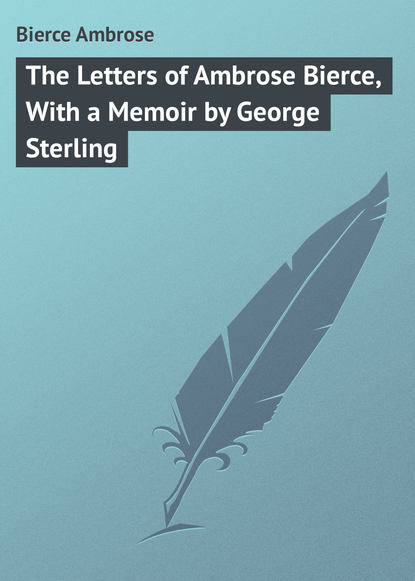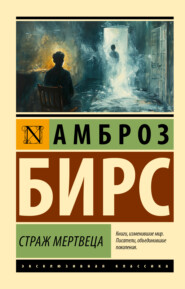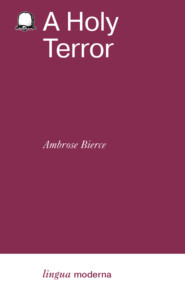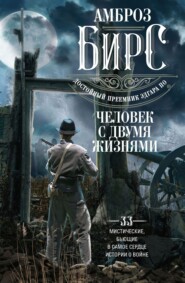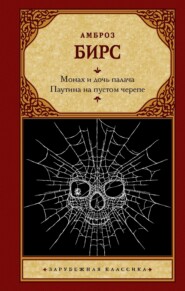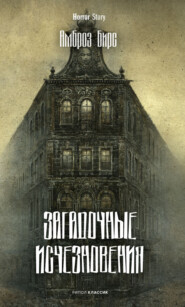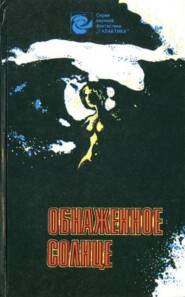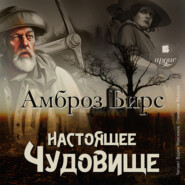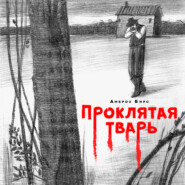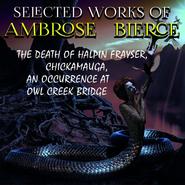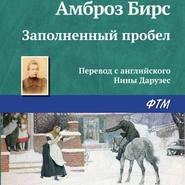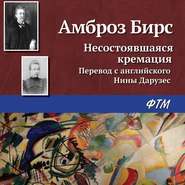По всем вопросам обращайтесь на: info@litportal.ru
(©) 2003-2024.
✖
The Letters of Ambrose Bierce, With a Memoir by George Sterling
Настройки чтения
Размер шрифта
Высота строк
Поля
The Letters of Ambrose Bierce, With a Memoir by George Sterling
Ambrose Bierce
Bierce Ambrose
The Letters of Ambrose Bierce, With a Memoir by George Sterling
The Introduction
by Bertha Clark Pope
"The question that starts to the lips of ninety-nine readers out of a hundred," says Arnold Bennett, in a review in the London New Age in 1909, "even the best informed, will assuredly be: 'Who is Ambrose Bierce?' I scarcely know, but I will say that among what I may term 'underground reputations' that of Ambrose Bierce is perhaps the most striking example. You may wander for years through literary circles and never meet anybody who has heard of Ambrose Bierce, and then you may hear some erudite student whisper in an awed voice: 'Ambrose Bierce is the greatest living prose writer.' I have heard such an opinion expressed."
Bierce himself shows his recognition of the "underground" quality of his reputation in a letter to George Sterling: "How many times, and during a period of how many years must one's unexplainable obscurity be pointed out to constitute fame? Not knowing, I am almost disposed to consider myself the most famous of authors. I have pretty nearly ceased to be 'discovered,' but my notoriety as an obscurian may be said to be worldwide and everlasting."
Anything which would throw light on such a figure, at once obscure and famous, is valuable. These letters of Ambrose Bierce, here printed for the first time, are therefore of unusual interest. They are the informal literary work – the term is used advisedly – of a man esteemed great by a small but acutely critical group, read enthusiastically by a somewhat larger number to whom critical examination of what they read seldom occurs, and ignored by the vast majority of readers; a man at once more hated and more adored than any on the Pacific Coast; a man not ten years off the scene yet already become a tradition and a legend; whose life, no less than his death, held elements of mystery, baffling contradictions, problems for puzzled conjecture, motives and meanings not vouchsafed to outsiders.
Were Ambrose Bierce as well known as he deserves to be, the introduction to these letters could be slight; we should not have to stop to inquire who he was and what he did. As it is, we must.
Ambrose Bierce, the son of Marcus Aurelius and Laura (Sherwood) Bierce, born in Meiggs County, Ohio, June 24, 1842, was at the outbreak of the Civil War a youth without formal education, but with a mind already trained. "My father was a poor farmer," he once said to a friend, "and could give me no general education, but he had a good library, and to his books I owe all that I have." He promptly volunteered in 1861 and served throughout the war. Twice, at the risk of his life, he rescued wounded companions from the battlefield, and at Kenesaw Mountain was himself severely wounded in the head. He was brevetted Major for distinguished services; but in after life never permitted the title to be used in addressing him. There is a story that when the war was over he tossed up a coin to determine what should be his career. Whatever the determining auguries, he came at once to San Francisco to join his favorite brother Albert – there were ten brothers and sisters to choose from – and for a short time worked with him in the Mint; he soon began writing paragraphs for the weeklies, particularly the Argonautand the News Letter.
"I was a slovenly writer in those days," he observes in a letter forty years later, "though enough better than my neighbors to have attracted my own attention. My knowledge of English was imperfect 'a whole lot.' Indeed, my intellectual status (whatever it may be, and God knows it's enough to make me blush) was of slow growth – as was my moral. I mean, I had not literary sincerity." Apparently, attention other than his own was attracted, for he was presently editing the News Letter.
In 1872 he went to London and for four years was on the staff of Fun. In London Bierce found congenial and stimulating associates. The great man of his circle was George Augustus Sala, "one of the most skilful, finished journalists ever known," a keen satiric wit, and the author of a ballad of which it is said that Swift might have been proud. Another notable figure was Tom Hood the younger, mordantly humorous. The satiric style in journalism was popular then; and "personal" journals were so personal that one "Jimmy" Davis, editor of the Cuckoo and the Bat successively, found it healthful to remain some years in exile in France. Bierce contributed to several of these and to Figaro, the editor of which was James Mortimer. To this gentleman Bierce owed what he designated as the distinction of being "probably the only American journalist who was ever employed by an Empress in so congenial a pursuit as the pursuit of another journalist." This other journalist was M. Henri Rochefort, communard, formerly editor of La Lanternein Paris, in which he had made incessant war upon the Empire and all its personnel, particularly the Empress. When, an exile, Rochefort announced his intention of renewing La Lanterne in London, the exiled Empress circumvented him by secretly copyrighting the title, The Lantern, and proceeding to publish a periodical under that name with the purpose of undermining his influence. Two numbers were enough; M. Rochefort fled to Belgium. Bierce said that in "the field of chromatic journalism" it was the finest thing that ever came from a press, but of the literary excellence of the twelve pages he felt less qualified for judgment as he had written every line.
This was in 1874. Two years earlier, under his journalistic pseudonym of "Dod Grile," he had published his first books – two small volumes, largely made up of his articles in the San Francisco News Letter, called The Fiend's Delight, and Nuggets And Dust Panned Out In California. Now, he used the same pseudonym on the title-page of a third volume, Cobwebs from an Empty Skull. The Cobwebs were selections from his work in Fun– satirical tales and fables, often inspired by weird old woodcuts given him by the editors with the request that he write something to fit. His journalistic associates praised these volumes liberally, and a more distinguished admirer was Gladstone, who, discovering the Cobwebs in a second-hand bookshop, voiced his delight in their cleverness, and by his praise gave a certain currency to Bierce's name among the London elect. But despite so distinguished a sponsor, the books remained generally unknown.
Congenial tasks and association with the brilliant journalists of the day did not prevent Bierce from being undeniably hard up at times. In 1876 he returned to San Francisco, where he remained for twenty-one years, save for a brief but eventful career as general manager of a mining company near Deadwood, South Dakota. All this time he got his living by writing special articles – for the Wasp, a weekly whose general temper may be accurately surmised from its name, and, beginning in 1886, for the Examiner, in which he conducted every Sunday on the editorial page a department to which he gave the title he had used for a similar column in The Lantern – Prattle. A partial explanation of a mode of feeling and a choice of themes which Bierce developed more and more, ultimately to the practical exclusion of all others, is to be found in the particular phase through which California journalism was just then passing.
In the evolution of the comic spirit the lowest stage, that of delight in inflicting pain on others, is clearly manifest in savages, small boys, and early American journalism. It was exhibited in all parts of America – Mark Twain gives a vivid example in his Journalistic Wild Oats of what it was in Tennessee – but with particular intensity in San Francisco. As a community, San Francisco exalted personal courage, directness of encounter, straight and effective shooting. The social group was so small and so homogeneous that any news of importance would be well known before it could be reported, set up in type, printed, and circulated. It was isolated by so great distances from the rest of the world that for years no pretense was made of furnishing adequate news from the outside. So the newspapers came to rely on other sorts of interest. They were pamphlets for the dissemination of the opinions of the groups controlling them, and weapons for doing battle, if need be, for those opinions. And there was abundant occasion: municipal affairs were corrupt, courts weak or venal, or both. Editors and readers enjoyed a good fight; they also wanted humorous entertainment; they happily combined the two. In the creative dawn of 1847 when the foundations of the journalistic earth were laid and those two morning stars, the Californian of Monterey and the California Star of San Francisco, sang together, we find the editors attacking the community generally, and each other particularly, with the utmost ferocity, laying about them right and left with verbal broad-axes, crow-bars, and such other weapons as might be immediately at hand. The California Star's introduction to the public of what would, in our less direct day, be known as its "esteemed contemporary" is typical:
"We have received two late numbers of the Californian, a dim, dirty little paper printed in Monterey on the worn-out materials of one of the old California WAR PRESSES. It is published and edited by Walter Colton and Robert Semple, the one a WHINING SYCOPHANT, and the other an OVER-GROWN LICK-SPITTLE. At the top of one of the papers we find the words 'please exchange.' This would be considered in almost any other country a bare-faced attempt to swindle us. We should consider it so now were it not for the peculiar situation of our country which induces us to do a great deal for others in order for them to do us a little good… We have concluded to give our paper to them this year, so as to afford them some insight into the manner in which a Republican newspaper should be conducted. They appear now to be awfully verdant."
Down through the seventies and eighties the tradition persisted, newspapers being bought and read, as a historian of journalism asserts, not so much for news as to see who was getting "lambasted" that day. It is not strange, then, that journals of redoubtable pugnacity were popular, or that editors favored writers who were likely to excel in the gladiatorial style. It is significant that public praise first came to Bierce through his articles in the caustic News Letter, widely read on the Pacific Coast during the seventies. Once launched in this line, he became locally famous for his fierce and witty articles in the Argonaunt and the Wasp, and for many years his column Prattle in the Examiner was, in the words of Mr. Bailey Millard, "the most wickedly clever, the most audaciously personal, and the most eagerly devoured column of causerie that ever was printed in this country."
In 1896 Bierce was sent to Washington to fight, through the Hearst newspapers, the "refunding bill" which Collis P. Huntington was trying to get passed, releasing his Central Pacific Railroad from its obligations to the government. A year later he went again to Washington, where he remained during the rest of his journalistic career, as correspondent for the New York American, conducting also for some years a department in the Cosmopolitan.
Much of Bierce's best work was done in those years in San Francisco. Through the columns of the Wasp and the Examinerhis wit played free; he wielded an extraordinary influence; his trenchant criticism made and unmade reputations – literary and otherwise. But this to Bierce was mostly "journalism, a thing so low that it cannot be mentioned in the same breath with literature." His real interest lay elsewhere. Throughout the early eighties he devoted himself to writing stories; all were rejected by the magazine editors to whom he offered them. When finally in 1890 he gathered these stories together into book form and offered them to the leading publishers of the country, they too, would have none of them. "These men," writes Mr. Bailey Millard, "admitted the purity of his diction and the magic of his haunting power, but the stories were regarded as revolting."
At last, in 1891, his first book of stories, Tales of Soldiers and Civilians, saw the reluctant light of day. It had this for foreword:
"Denied existence by the chief publishing houses of the country, this book owes itself to Mr. E. L. G. Steele, merchant, of this city, [San Francisco]. In attesting Mr. Steele's faith in his judgment and his friend, it will serve its author's main and best ambition."
There is Biercean pugnacity in these words; the author flings down the gauntlet with a confident gesture. But it cannot be said that anything much happened to discomfit the publishing houses of little faith. Apparently, Bierce had thought to appeal past the dull and unjust verdict of such lower courts to the higher tribunal of the critics and possibly an elect group of general readers who might be expected to recognize and welcome something rare. But judgment was scarcely reversed. Only a few critics were discerning, and the book had no vogue. When The Monk and the Hangman's Daughter was published by F. J. Schulte and Company, Chicago, the next year, and Can Such Things Be by The Cassell Publishing Company, the year following, a few enthusiastic critics could find no words strong enough to describe Bierce's vivid imagination, his uncanny divination of atavistic terrors in man's consciousness, his chiseled perfection of style; but the critics who disapproved had even more trouble in finding words strong enough for their purposes and, as before, there was no general appreciation.
For the next twenty years Ambrose Bierce was a prolific writer but, whatever the reason, no further volumes of stories from his pen were presented to the world. Black Beetles in Amber, a collection of satiric verse, had appeared the same year as The Monk and the Hangman's Daughter; then for seven years, with the exception of a republication by G. P. Putnam's Sons of Tales of Soldiers and Civiliansunder the title, In the Midst of Life, no books by Bierce. In 1899 appeared Fantastic Fables; in 1903 Shapes of Clay, more satiric verse; in 1906 The Cynic's Word Book, a dictionary of wicked epigrams; in 1909 Write it Right, a blacklist of literary faults, and The Shadow on the Dial, a collection of essays covering, to quote from the preface of S. O. Howes, "a wide range of subjects, embracing among other things, government, dreams, writers of dialect and dogs" – Mr. Howes might have heightened his crescendo by adding "emancipated woman"; and finally – 1909 to 1912 —The Collected Works of Ambrose Bierce, containing all his work previously published in book form, save the two last mentioned, and much more besides, all collected and edited by Bierce himself.
On October 2, 1913, Ambrose Bierce, having settled his business affairs, left Washington for a trip through the southern states, declaring in letters his purpose of going into Mexico and later on to South America. The fullest account of his trip and his plans is afforded by a newspaper clipping he sent his niece in a letter dated November 6, 1913; through the commonplaceness of the reportorial vocabulary shines out the vivid personality that was making its final exit:
"Traveling over the same ground that he had covered with General Hazen's brigade during the Civil War, Ambrose Bierce, famed writer and noted critic, has arrived in New Orleans. Not that this city was one of the places figuring in his campaigns, for he was here after and not during the war. He has come to New Orleans in a haphazard, fancy-free way, making a trip toward Mexico. The places that he has visited on the way down have become famous in song and story – places where the greatest battles were fought, where the moon shone at night on the burial corps, and where in day the sun shone bright on polished bayonets and the smoke drifted upward from the cannon mouths.
"For Mr. Bierce was at Chickamauga; he was at Shiloh; at Murfreesboro; Kenesaw Mountain, Franklin and Nashville. And then when wounded during the Atlanta campaign he was invalided home. He 'has never amounted to much since then,' he said Saturday. But his stories of the great struggle, living as deathless characterizations of the bloody episodes, stand for what he 'has amounted to since then.'
"Perhaps it was in mourning for the dead over whose battlefields he has been wending his way toward New Orleans that Mr. Bierce was dressed in black. From head to foot he was attired in this color, except where the white cuffs and collar and shirt front showed through. He even carried a walking cane, black as ebony and unrelieved by gold or silver. But his eyes, blue and piercing as when they strove to see through the smoke at Chickamauga, retained all the fire of the indomitable fighter.
"'I'm on my way to Mexico, because I like the game,' he said, 'I like the fighting; I want to see it. And then I don't think Americans are as oppressed there as they say they are, and I want to get at the true facts of the case. Of course, I'm not going into the country if I find it unsafe for Americans to be there, but I want to take a trip diagonally across from northeast to southwest by horseback, and then take ship for South America, go over the Andes and across that continent, if possible, and come back to America again.
"'There is no family that I have to take care of; I've retired from writing and I'm going to take a rest. No, my trip isn't for local color. I've retired just the same as a merchant or business man retires. I'm leaving the field for the younger authors.'
"An inquisitive question was interjected as to whether Mr. Bierce had acquired a competency only from his writings, but he did not take offense.
"'My wants are few, and modest,' he said, 'and my royalties give me quite enough to live on. There isn't much that I need, and I spend my time in quiet travel. For the last five years I haven't done any writing. Don't you think that after a man has worked as long as I have that he deserves a rest? But perhaps after I have rested I might work some more – I can't tell, there are so many things – ' and the straightforward blue eyes took on a faraway look, 'there are so many things that might happen between now and when I come back. My trip might take several years, and I'm an old man now.'
"Except for the thick, snow-white hair no one would think him old. His hands are steady, and he stands up straight and tall – perhaps six feet."
In December of that same year the last letter he is known to have written was received by his daughter. It is dated from Chihuahua, and mentions casually that he has attached himself unofficially to a division of Villa's army, and speaks of a prospective advance on Ojinaga. No further word has ever come from or of Ambrose Bierce. Whether illness overtook him, then an old man of seventy-one, and death suddenly, or whether, preferring to go foaming over a precipice rather than to straggle out in sandy deltas, he deliberately went where he knew death was, no one can say. His last letters, dauntless, grave, tender, do not say, though they suggest much. "You must try to forgive my obstinacy in not 'perishing' where I am," he wrote as he left Washington. "I want to be where something worth while is going on, or where nothing whatever is going on." "Good-bye – if you hear of my being stood up against a Mexican stone wall and shot to rags please know that I think that a pretty good way to depart this life. It beats old age, disease, or falling down the cellar stairs. To be a Gringo in Mexico – ah, that is euthanasia!" Whatever end Ambrose Bierce found in Mexico, the lines of George Sterling well express what must have been his attitude in meeting it:
"Dream you he was afraid to live?
Dream you he was afraid to die?
Or that, a suppliant of the sky,
He begged the gods to keep or give?
Not thus the shadow-maker stood,
Whose scrutiny dissolved so well
Our thin mirage of Heaven or Hell —
The doubtful evil, dubious good…
"If now his name be with the dead,
And where the gaunt agaves flow'r,
The vulture and the wolf devour
The lion-heart, the lion-head,
Be sure that heart and head were laid
In wisdom down, content to die;
Be sure he faced the Starless Sky
Unduped, unmurmuring, unafraid."
In any consideration of the work of Ambrose Bierce, a central question must be why it contains so much that is trivial or ephemeral. Another question facing every critic of Bierce, is why the fundamentally original point of view, the clarity of workmanship of his best things – mainly stories – did not win him immediate and general recognition.
A partial answer to both questions is to be found in a certain discord between Bierce and his setting. Bierce, paradoxically, combined the bizarre in substance, the severely restrained and compressed in form. An ironic mask covered a deep-seated sensibility; but sensibility and irony were alike subject to an uncompromising truthfulness; he would have given deep-throated acclaim to Clough's
"But play no tricks upon thy soul, O man,
Let truth be truth, and life the thing it can."
He had the aristocrat's contempt for mass feeling, a selectiveness carried so far that he instinctively chose for themes the picked person and experience, the one decisive moment of crisis. He viewed his characters not in relation to other men and in normal activities; he isolated them – often amid abnormalities.
All this was in sharp contrast to the literary fashion obtaining when he dipped his pen to try his luck as a creative artist. The most popular novelist of the day was Dickens; the most popular poet, Tennyson. Neither looked straight at life; both veiled it: one in benevolence, the other in beauty. Direct and painful verities were best tolerated by the reading public when exhibited as instances of the workings of natural law. The spectator of the macrocosm in action could stomach the wanton destruction of a given human atom; one so privileged could and did excuse the Creator for small mistakes like harrying Hetty Sorrell to the gallow's foot, because of the conviction that, taking the Universe by and large, "He was a good fellow, and 'twould all be well." This benevolent optimism was the offspring of a strange pair, evangelicism and evolution; and in the minds of the great public whom Bierce, under other circumstances and with a slightly different mixture of qualities in himself, might have conquered, it became a large, soft insincerity that demanded "happy endings," a profuse broadness of treatment prohibitive of harsh simplicity, a swathing of elemental emotion in gentility or moral edification.
But to Bierce's mind, "noble and nude and antique," this mid-Victorian draping and bedecking of "unpleasant truths" was abhorrent. Absolutely direct and unafraid – not only in his personal relations but, what is more rare, in his thinking – he regarded easy optimism, sure that God is in his heaven with consequently good effects upon the world, as blindness, and the hopefulness that demanded always the "happy ending," as silly. In many significant passages Bierce's attitude is the ironic one of Voltaire: "'Had not Pangloss got himself hanged,' replied Candide, 'he would have given us most excellent advice in this emergency; for he was a profound philosopher.'" Bierce did not fear to bring in disconcerting evidence that a priori reasoning may prove a not infallible guide, that causes do not always produce the effects complacently pre-argued, and that the notion of this as the best of all possible worlds is sometimes beside the point.
The themes permitted by such an attitude were certain to displease the readers of that period. In Tales of Soldiers and Civilians, his first book of stories, he looks squarely and grimly at one much bedecked subject of the time – war; not the fine gay gallantry of war, the music and the marching and the romantic episodes; but the ghastly horror of it; through his vivid, dramatic passages beats a hatred of war, not merely "unrighteous" war, but all war, the more disquieting because never allowed to become articulate. With bitter but beautiful truth he brings each tale to its tragic close, always with one last turn of the screw, one unexpected horror more. And in this book – note the solemn implication of the title he later gave it, In the Midst of Life– as well as in the next, Can Such Things Be, is still another subject which Bierce alone in his generation seemed unafraid to consider curiously: "Death, in warfare and in the horrid guise of the supernatural, was painted over and over. Man's terror in the face of death gave the artist his cue for his wonderful physical and psychologic microscopics. You could not pin this work down as realism, or as romance; it was the greatest human drama – the conflict between life and death – fused through genius. Not Zola, in the endless pages of his Debâcle, not the great Tolstoi in his great War and Peacehad ever painted war, horrid war, more faithfully than any of the stories of this book; not Maupassant had invented out of war's terrible truths more dramatically imagined plots… There painted an artist who had seen the thing itself, and being a genius, had made it an art still greater.
Ambrose Bierce
Bierce Ambrose
The Letters of Ambrose Bierce, With a Memoir by George Sterling
The Introduction
by Bertha Clark Pope
"The question that starts to the lips of ninety-nine readers out of a hundred," says Arnold Bennett, in a review in the London New Age in 1909, "even the best informed, will assuredly be: 'Who is Ambrose Bierce?' I scarcely know, but I will say that among what I may term 'underground reputations' that of Ambrose Bierce is perhaps the most striking example. You may wander for years through literary circles and never meet anybody who has heard of Ambrose Bierce, and then you may hear some erudite student whisper in an awed voice: 'Ambrose Bierce is the greatest living prose writer.' I have heard such an opinion expressed."
Bierce himself shows his recognition of the "underground" quality of his reputation in a letter to George Sterling: "How many times, and during a period of how many years must one's unexplainable obscurity be pointed out to constitute fame? Not knowing, I am almost disposed to consider myself the most famous of authors. I have pretty nearly ceased to be 'discovered,' but my notoriety as an obscurian may be said to be worldwide and everlasting."
Anything which would throw light on such a figure, at once obscure and famous, is valuable. These letters of Ambrose Bierce, here printed for the first time, are therefore of unusual interest. They are the informal literary work – the term is used advisedly – of a man esteemed great by a small but acutely critical group, read enthusiastically by a somewhat larger number to whom critical examination of what they read seldom occurs, and ignored by the vast majority of readers; a man at once more hated and more adored than any on the Pacific Coast; a man not ten years off the scene yet already become a tradition and a legend; whose life, no less than his death, held elements of mystery, baffling contradictions, problems for puzzled conjecture, motives and meanings not vouchsafed to outsiders.
Were Ambrose Bierce as well known as he deserves to be, the introduction to these letters could be slight; we should not have to stop to inquire who he was and what he did. As it is, we must.
Ambrose Bierce, the son of Marcus Aurelius and Laura (Sherwood) Bierce, born in Meiggs County, Ohio, June 24, 1842, was at the outbreak of the Civil War a youth without formal education, but with a mind already trained. "My father was a poor farmer," he once said to a friend, "and could give me no general education, but he had a good library, and to his books I owe all that I have." He promptly volunteered in 1861 and served throughout the war. Twice, at the risk of his life, he rescued wounded companions from the battlefield, and at Kenesaw Mountain was himself severely wounded in the head. He was brevetted Major for distinguished services; but in after life never permitted the title to be used in addressing him. There is a story that when the war was over he tossed up a coin to determine what should be his career. Whatever the determining auguries, he came at once to San Francisco to join his favorite brother Albert – there were ten brothers and sisters to choose from – and for a short time worked with him in the Mint; he soon began writing paragraphs for the weeklies, particularly the Argonautand the News Letter.
"I was a slovenly writer in those days," he observes in a letter forty years later, "though enough better than my neighbors to have attracted my own attention. My knowledge of English was imperfect 'a whole lot.' Indeed, my intellectual status (whatever it may be, and God knows it's enough to make me blush) was of slow growth – as was my moral. I mean, I had not literary sincerity." Apparently, attention other than his own was attracted, for he was presently editing the News Letter.
In 1872 he went to London and for four years was on the staff of Fun. In London Bierce found congenial and stimulating associates. The great man of his circle was George Augustus Sala, "one of the most skilful, finished journalists ever known," a keen satiric wit, and the author of a ballad of which it is said that Swift might have been proud. Another notable figure was Tom Hood the younger, mordantly humorous. The satiric style in journalism was popular then; and "personal" journals were so personal that one "Jimmy" Davis, editor of the Cuckoo and the Bat successively, found it healthful to remain some years in exile in France. Bierce contributed to several of these and to Figaro, the editor of which was James Mortimer. To this gentleman Bierce owed what he designated as the distinction of being "probably the only American journalist who was ever employed by an Empress in so congenial a pursuit as the pursuit of another journalist." This other journalist was M. Henri Rochefort, communard, formerly editor of La Lanternein Paris, in which he had made incessant war upon the Empire and all its personnel, particularly the Empress. When, an exile, Rochefort announced his intention of renewing La Lanterne in London, the exiled Empress circumvented him by secretly copyrighting the title, The Lantern, and proceeding to publish a periodical under that name with the purpose of undermining his influence. Two numbers were enough; M. Rochefort fled to Belgium. Bierce said that in "the field of chromatic journalism" it was the finest thing that ever came from a press, but of the literary excellence of the twelve pages he felt less qualified for judgment as he had written every line.
This was in 1874. Two years earlier, under his journalistic pseudonym of "Dod Grile," he had published his first books – two small volumes, largely made up of his articles in the San Francisco News Letter, called The Fiend's Delight, and Nuggets And Dust Panned Out In California. Now, he used the same pseudonym on the title-page of a third volume, Cobwebs from an Empty Skull. The Cobwebs were selections from his work in Fun– satirical tales and fables, often inspired by weird old woodcuts given him by the editors with the request that he write something to fit. His journalistic associates praised these volumes liberally, and a more distinguished admirer was Gladstone, who, discovering the Cobwebs in a second-hand bookshop, voiced his delight in their cleverness, and by his praise gave a certain currency to Bierce's name among the London elect. But despite so distinguished a sponsor, the books remained generally unknown.
Congenial tasks and association with the brilliant journalists of the day did not prevent Bierce from being undeniably hard up at times. In 1876 he returned to San Francisco, where he remained for twenty-one years, save for a brief but eventful career as general manager of a mining company near Deadwood, South Dakota. All this time he got his living by writing special articles – for the Wasp, a weekly whose general temper may be accurately surmised from its name, and, beginning in 1886, for the Examiner, in which he conducted every Sunday on the editorial page a department to which he gave the title he had used for a similar column in The Lantern – Prattle. A partial explanation of a mode of feeling and a choice of themes which Bierce developed more and more, ultimately to the practical exclusion of all others, is to be found in the particular phase through which California journalism was just then passing.
In the evolution of the comic spirit the lowest stage, that of delight in inflicting pain on others, is clearly manifest in savages, small boys, and early American journalism. It was exhibited in all parts of America – Mark Twain gives a vivid example in his Journalistic Wild Oats of what it was in Tennessee – but with particular intensity in San Francisco. As a community, San Francisco exalted personal courage, directness of encounter, straight and effective shooting. The social group was so small and so homogeneous that any news of importance would be well known before it could be reported, set up in type, printed, and circulated. It was isolated by so great distances from the rest of the world that for years no pretense was made of furnishing adequate news from the outside. So the newspapers came to rely on other sorts of interest. They were pamphlets for the dissemination of the opinions of the groups controlling them, and weapons for doing battle, if need be, for those opinions. And there was abundant occasion: municipal affairs were corrupt, courts weak or venal, or both. Editors and readers enjoyed a good fight; they also wanted humorous entertainment; they happily combined the two. In the creative dawn of 1847 when the foundations of the journalistic earth were laid and those two morning stars, the Californian of Monterey and the California Star of San Francisco, sang together, we find the editors attacking the community generally, and each other particularly, with the utmost ferocity, laying about them right and left with verbal broad-axes, crow-bars, and such other weapons as might be immediately at hand. The California Star's introduction to the public of what would, in our less direct day, be known as its "esteemed contemporary" is typical:
"We have received two late numbers of the Californian, a dim, dirty little paper printed in Monterey on the worn-out materials of one of the old California WAR PRESSES. It is published and edited by Walter Colton and Robert Semple, the one a WHINING SYCOPHANT, and the other an OVER-GROWN LICK-SPITTLE. At the top of one of the papers we find the words 'please exchange.' This would be considered in almost any other country a bare-faced attempt to swindle us. We should consider it so now were it not for the peculiar situation of our country which induces us to do a great deal for others in order for them to do us a little good… We have concluded to give our paper to them this year, so as to afford them some insight into the manner in which a Republican newspaper should be conducted. They appear now to be awfully verdant."
Down through the seventies and eighties the tradition persisted, newspapers being bought and read, as a historian of journalism asserts, not so much for news as to see who was getting "lambasted" that day. It is not strange, then, that journals of redoubtable pugnacity were popular, or that editors favored writers who were likely to excel in the gladiatorial style. It is significant that public praise first came to Bierce through his articles in the caustic News Letter, widely read on the Pacific Coast during the seventies. Once launched in this line, he became locally famous for his fierce and witty articles in the Argonaunt and the Wasp, and for many years his column Prattle in the Examiner was, in the words of Mr. Bailey Millard, "the most wickedly clever, the most audaciously personal, and the most eagerly devoured column of causerie that ever was printed in this country."
In 1896 Bierce was sent to Washington to fight, through the Hearst newspapers, the "refunding bill" which Collis P. Huntington was trying to get passed, releasing his Central Pacific Railroad from its obligations to the government. A year later he went again to Washington, where he remained during the rest of his journalistic career, as correspondent for the New York American, conducting also for some years a department in the Cosmopolitan.
Much of Bierce's best work was done in those years in San Francisco. Through the columns of the Wasp and the Examinerhis wit played free; he wielded an extraordinary influence; his trenchant criticism made and unmade reputations – literary and otherwise. But this to Bierce was mostly "journalism, a thing so low that it cannot be mentioned in the same breath with literature." His real interest lay elsewhere. Throughout the early eighties he devoted himself to writing stories; all were rejected by the magazine editors to whom he offered them. When finally in 1890 he gathered these stories together into book form and offered them to the leading publishers of the country, they too, would have none of them. "These men," writes Mr. Bailey Millard, "admitted the purity of his diction and the magic of his haunting power, but the stories were regarded as revolting."
At last, in 1891, his first book of stories, Tales of Soldiers and Civilians, saw the reluctant light of day. It had this for foreword:
"Denied existence by the chief publishing houses of the country, this book owes itself to Mr. E. L. G. Steele, merchant, of this city, [San Francisco]. In attesting Mr. Steele's faith in his judgment and his friend, it will serve its author's main and best ambition."
There is Biercean pugnacity in these words; the author flings down the gauntlet with a confident gesture. But it cannot be said that anything much happened to discomfit the publishing houses of little faith. Apparently, Bierce had thought to appeal past the dull and unjust verdict of such lower courts to the higher tribunal of the critics and possibly an elect group of general readers who might be expected to recognize and welcome something rare. But judgment was scarcely reversed. Only a few critics were discerning, and the book had no vogue. When The Monk and the Hangman's Daughter was published by F. J. Schulte and Company, Chicago, the next year, and Can Such Things Be by The Cassell Publishing Company, the year following, a few enthusiastic critics could find no words strong enough to describe Bierce's vivid imagination, his uncanny divination of atavistic terrors in man's consciousness, his chiseled perfection of style; but the critics who disapproved had even more trouble in finding words strong enough for their purposes and, as before, there was no general appreciation.
For the next twenty years Ambrose Bierce was a prolific writer but, whatever the reason, no further volumes of stories from his pen were presented to the world. Black Beetles in Amber, a collection of satiric verse, had appeared the same year as The Monk and the Hangman's Daughter; then for seven years, with the exception of a republication by G. P. Putnam's Sons of Tales of Soldiers and Civiliansunder the title, In the Midst of Life, no books by Bierce. In 1899 appeared Fantastic Fables; in 1903 Shapes of Clay, more satiric verse; in 1906 The Cynic's Word Book, a dictionary of wicked epigrams; in 1909 Write it Right, a blacklist of literary faults, and The Shadow on the Dial, a collection of essays covering, to quote from the preface of S. O. Howes, "a wide range of subjects, embracing among other things, government, dreams, writers of dialect and dogs" – Mr. Howes might have heightened his crescendo by adding "emancipated woman"; and finally – 1909 to 1912 —The Collected Works of Ambrose Bierce, containing all his work previously published in book form, save the two last mentioned, and much more besides, all collected and edited by Bierce himself.
On October 2, 1913, Ambrose Bierce, having settled his business affairs, left Washington for a trip through the southern states, declaring in letters his purpose of going into Mexico and later on to South America. The fullest account of his trip and his plans is afforded by a newspaper clipping he sent his niece in a letter dated November 6, 1913; through the commonplaceness of the reportorial vocabulary shines out the vivid personality that was making its final exit:
"Traveling over the same ground that he had covered with General Hazen's brigade during the Civil War, Ambrose Bierce, famed writer and noted critic, has arrived in New Orleans. Not that this city was one of the places figuring in his campaigns, for he was here after and not during the war. He has come to New Orleans in a haphazard, fancy-free way, making a trip toward Mexico. The places that he has visited on the way down have become famous in song and story – places where the greatest battles were fought, where the moon shone at night on the burial corps, and where in day the sun shone bright on polished bayonets and the smoke drifted upward from the cannon mouths.
"For Mr. Bierce was at Chickamauga; he was at Shiloh; at Murfreesboro; Kenesaw Mountain, Franklin and Nashville. And then when wounded during the Atlanta campaign he was invalided home. He 'has never amounted to much since then,' he said Saturday. But his stories of the great struggle, living as deathless characterizations of the bloody episodes, stand for what he 'has amounted to since then.'
"Perhaps it was in mourning for the dead over whose battlefields he has been wending his way toward New Orleans that Mr. Bierce was dressed in black. From head to foot he was attired in this color, except where the white cuffs and collar and shirt front showed through. He even carried a walking cane, black as ebony and unrelieved by gold or silver. But his eyes, blue and piercing as when they strove to see through the smoke at Chickamauga, retained all the fire of the indomitable fighter.
"'I'm on my way to Mexico, because I like the game,' he said, 'I like the fighting; I want to see it. And then I don't think Americans are as oppressed there as they say they are, and I want to get at the true facts of the case. Of course, I'm not going into the country if I find it unsafe for Americans to be there, but I want to take a trip diagonally across from northeast to southwest by horseback, and then take ship for South America, go over the Andes and across that continent, if possible, and come back to America again.
"'There is no family that I have to take care of; I've retired from writing and I'm going to take a rest. No, my trip isn't for local color. I've retired just the same as a merchant or business man retires. I'm leaving the field for the younger authors.'
"An inquisitive question was interjected as to whether Mr. Bierce had acquired a competency only from his writings, but he did not take offense.
"'My wants are few, and modest,' he said, 'and my royalties give me quite enough to live on. There isn't much that I need, and I spend my time in quiet travel. For the last five years I haven't done any writing. Don't you think that after a man has worked as long as I have that he deserves a rest? But perhaps after I have rested I might work some more – I can't tell, there are so many things – ' and the straightforward blue eyes took on a faraway look, 'there are so many things that might happen between now and when I come back. My trip might take several years, and I'm an old man now.'
"Except for the thick, snow-white hair no one would think him old. His hands are steady, and he stands up straight and tall – perhaps six feet."
In December of that same year the last letter he is known to have written was received by his daughter. It is dated from Chihuahua, and mentions casually that he has attached himself unofficially to a division of Villa's army, and speaks of a prospective advance on Ojinaga. No further word has ever come from or of Ambrose Bierce. Whether illness overtook him, then an old man of seventy-one, and death suddenly, or whether, preferring to go foaming over a precipice rather than to straggle out in sandy deltas, he deliberately went where he knew death was, no one can say. His last letters, dauntless, grave, tender, do not say, though they suggest much. "You must try to forgive my obstinacy in not 'perishing' where I am," he wrote as he left Washington. "I want to be where something worth while is going on, or where nothing whatever is going on." "Good-bye – if you hear of my being stood up against a Mexican stone wall and shot to rags please know that I think that a pretty good way to depart this life. It beats old age, disease, or falling down the cellar stairs. To be a Gringo in Mexico – ah, that is euthanasia!" Whatever end Ambrose Bierce found in Mexico, the lines of George Sterling well express what must have been his attitude in meeting it:
"Dream you he was afraid to live?
Dream you he was afraid to die?
Or that, a suppliant of the sky,
He begged the gods to keep or give?
Not thus the shadow-maker stood,
Whose scrutiny dissolved so well
Our thin mirage of Heaven or Hell —
The doubtful evil, dubious good…
"If now his name be with the dead,
And where the gaunt agaves flow'r,
The vulture and the wolf devour
The lion-heart, the lion-head,
Be sure that heart and head were laid
In wisdom down, content to die;
Be sure he faced the Starless Sky
Unduped, unmurmuring, unafraid."
In any consideration of the work of Ambrose Bierce, a central question must be why it contains so much that is trivial or ephemeral. Another question facing every critic of Bierce, is why the fundamentally original point of view, the clarity of workmanship of his best things – mainly stories – did not win him immediate and general recognition.
A partial answer to both questions is to be found in a certain discord between Bierce and his setting. Bierce, paradoxically, combined the bizarre in substance, the severely restrained and compressed in form. An ironic mask covered a deep-seated sensibility; but sensibility and irony were alike subject to an uncompromising truthfulness; he would have given deep-throated acclaim to Clough's
"But play no tricks upon thy soul, O man,
Let truth be truth, and life the thing it can."
He had the aristocrat's contempt for mass feeling, a selectiveness carried so far that he instinctively chose for themes the picked person and experience, the one decisive moment of crisis. He viewed his characters not in relation to other men and in normal activities; he isolated them – often amid abnormalities.
All this was in sharp contrast to the literary fashion obtaining when he dipped his pen to try his luck as a creative artist. The most popular novelist of the day was Dickens; the most popular poet, Tennyson. Neither looked straight at life; both veiled it: one in benevolence, the other in beauty. Direct and painful verities were best tolerated by the reading public when exhibited as instances of the workings of natural law. The spectator of the macrocosm in action could stomach the wanton destruction of a given human atom; one so privileged could and did excuse the Creator for small mistakes like harrying Hetty Sorrell to the gallow's foot, because of the conviction that, taking the Universe by and large, "He was a good fellow, and 'twould all be well." This benevolent optimism was the offspring of a strange pair, evangelicism and evolution; and in the minds of the great public whom Bierce, under other circumstances and with a slightly different mixture of qualities in himself, might have conquered, it became a large, soft insincerity that demanded "happy endings," a profuse broadness of treatment prohibitive of harsh simplicity, a swathing of elemental emotion in gentility or moral edification.
But to Bierce's mind, "noble and nude and antique," this mid-Victorian draping and bedecking of "unpleasant truths" was abhorrent. Absolutely direct and unafraid – not only in his personal relations but, what is more rare, in his thinking – he regarded easy optimism, sure that God is in his heaven with consequently good effects upon the world, as blindness, and the hopefulness that demanded always the "happy ending," as silly. In many significant passages Bierce's attitude is the ironic one of Voltaire: "'Had not Pangloss got himself hanged,' replied Candide, 'he would have given us most excellent advice in this emergency; for he was a profound philosopher.'" Bierce did not fear to bring in disconcerting evidence that a priori reasoning may prove a not infallible guide, that causes do not always produce the effects complacently pre-argued, and that the notion of this as the best of all possible worlds is sometimes beside the point.
The themes permitted by such an attitude were certain to displease the readers of that period. In Tales of Soldiers and Civilians, his first book of stories, he looks squarely and grimly at one much bedecked subject of the time – war; not the fine gay gallantry of war, the music and the marching and the romantic episodes; but the ghastly horror of it; through his vivid, dramatic passages beats a hatred of war, not merely "unrighteous" war, but all war, the more disquieting because never allowed to become articulate. With bitter but beautiful truth he brings each tale to its tragic close, always with one last turn of the screw, one unexpected horror more. And in this book – note the solemn implication of the title he later gave it, In the Midst of Life– as well as in the next, Can Such Things Be, is still another subject which Bierce alone in his generation seemed unafraid to consider curiously: "Death, in warfare and in the horrid guise of the supernatural, was painted over and over. Man's terror in the face of death gave the artist his cue for his wonderful physical and psychologic microscopics. You could not pin this work down as realism, or as romance; it was the greatest human drama – the conflict between life and death – fused through genius. Not Zola, in the endless pages of his Debâcle, not the great Tolstoi in his great War and Peacehad ever painted war, horrid war, more faithfully than any of the stories of this book; not Maupassant had invented out of war's terrible truths more dramatically imagined plots… There painted an artist who had seen the thing itself, and being a genius, had made it an art still greater.





